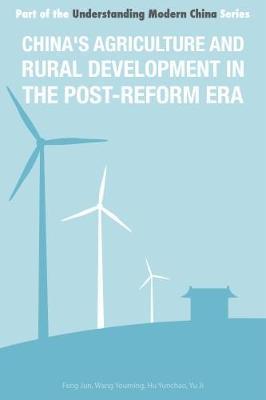China's Agriculture and Rural Development in The Post-Reform

China's Agriculture and Rural Development in The Post-Reform
China's much-vaunted 'reform and opening up' started in the countryside in the late 1970s with the change from planned, centralised, collectivised agriculture in commune and brigade enterprises to the creation of town and village enterprises (TVEs) based on the household contract responsibility system which allowed Chinese farmers for the first time since the founding of the PRC to use land to grow their own crops and develop their own agribusinesses once they had fulfilled their quotas for the collective.
This was nothing short of a revolution in agriculture which transformed China's agricultural economy from one characterized by perennial shortages to surpluses by 1998 - the turning point after 20 years of reforms. Since then, the reform and development of China's agriculture has gone from strength to strength.
As the authors of this book document in great detail:
The per capita net income of Chinese farmers has trebled over the past decade from Rmb2,622 in 2003 to Rmb7,917 in 2012 - an annual increase of over Rmb540 (US$80);
The growth in per capita net income of farmers has been higher than the growth of per capita disposable income of urban residents over the same period - holding out hope for reducing the urban/rural income gap - one of China's key long-term goals;
How China's Yuan Longping - publicly acknowledged by the International Rice Research Institute (IRRI) back in 1982 as the world's 'father of hybrid rice' - and his team developed a superior strain of hybrid rice enabling China to be self-reliant in rice consumption; Longping remains an active IRRI member to this day.
PRP: 68.00 Lei
Acesta este Prețul Recomandat de Producător. Prețul de vânzare al produsului este afișat mai jos.
61.20Lei
61.20Lei
68.00 LeiIndisponibil
Descrierea produsului
China's much-vaunted 'reform and opening up' started in the countryside in the late 1970s with the change from planned, centralised, collectivised agriculture in commune and brigade enterprises to the creation of town and village enterprises (TVEs) based on the household contract responsibility system which allowed Chinese farmers for the first time since the founding of the PRC to use land to grow their own crops and develop their own agribusinesses once they had fulfilled their quotas for the collective.
This was nothing short of a revolution in agriculture which transformed China's agricultural economy from one characterized by perennial shortages to surpluses by 1998 - the turning point after 20 years of reforms. Since then, the reform and development of China's agriculture has gone from strength to strength.
As the authors of this book document in great detail:
The per capita net income of Chinese farmers has trebled over the past decade from Rmb2,622 in 2003 to Rmb7,917 in 2012 - an annual increase of over Rmb540 (US$80);
The growth in per capita net income of farmers has been higher than the growth of per capita disposable income of urban residents over the same period - holding out hope for reducing the urban/rural income gap - one of China's key long-term goals;
How China's Yuan Longping - publicly acknowledged by the International Rice Research Institute (IRRI) back in 1982 as the world's 'father of hybrid rice' - and his team developed a superior strain of hybrid rice enabling China to be self-reliant in rice consumption; Longping remains an active IRRI member to this day.
Detaliile produsului










